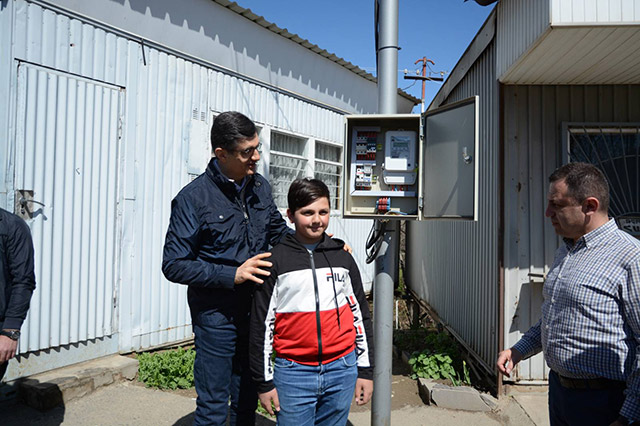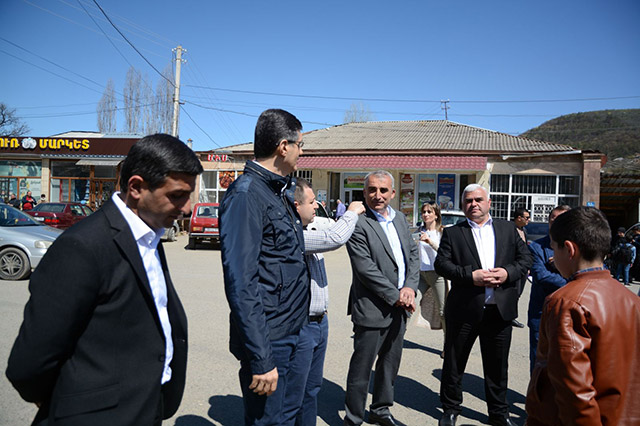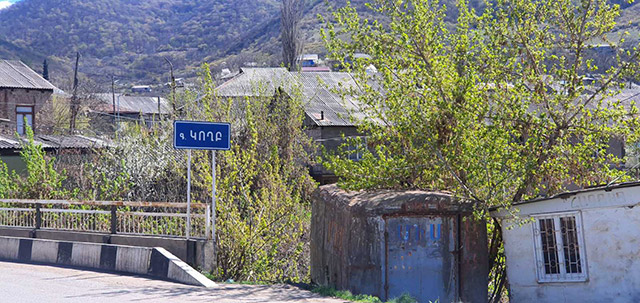The largest settlement of Tavush region, Koghb, has new outdoor street lighting system. Since 2019, three infrastructure development programs have been implemented in the village, located only 4.5 km from the state border. Viva-MTS and the Foundation for the Preservation of Wildlife and Cultural Assets (FPWC) initially solved the heating problem in Koghb Kindergarten, and from 2020 to date, have implemented two projects to introduce an energy-efficient lighting system.
Despite the challenges of recent years, the long-term partners have been consistent in carrying out the planned work. During 2020, 1850 meters of road was illuminated in Koghb, 50 LED lamps were installed. And next year, the number of LED lights increased by 37, illuminating 1,500 meters of road. Thus, as a result of two projects, at the end of 2021, thanks to the efforts of Viva-MTS and FPWC, 87 LED lamps were installed in the village, and a 3400-meter-long road was illuminated.
Koghb residents have been enjoying the results of the two-year program for three months now. Illuminated streets are considered important not only in terms of the need for infrastructure development, but also in terms of the safety of people living on the border.
Read also
Viva-MTS General Manager Ralph Yirikian, Noyemberyan community head Arsen Aghababyan, project coordinator Martin Maralchyan and the community residents participated in the system launching ceremony.
“Our real home is beyond the walls of our own homes. If we want to live in a proper environment we have to show an equal care and make adequate efforts for our common home, our country. Let those be small projects, but they should be mindfully crafted, consistently implemented and by all means fulfilled with a vision of accomplishment. The primary beneficiary of this program is the younger generation. Walking down illuminated streets and growing up in a bettered environment have to be part of life, not a dream. I want to believe, too, this type of programs are capable of conveying to young people the ideas of diligence, care for one’s country, ability to appreciate and to cherish what you have,” Viva-MTS General Manager Ralph Yirikian said.
Running an energy-efficient, modern system is cost-effective in terms of environmental sustainability and community savings. The project is also one of the important steps towards creation of the Eco-village Network. This allows these villages to be involved in a process based on four components of sustainability: environmental, economic, cultural and social. As a result of the program, the budget expenses of the community will be significantly reduced, and the savings will be directed to the solution of other problems in the community.
Viva-MTS (MTS Armenia CJSC) is Armenia’s leading telecommunications operator, having the widest network reach and spreading a wide range of Voice and Data services all across Armenia. Having the best of the Armenian people at heart since its launch on 1st July 2005 and in a short period of time Viva-MTS has managed to build a nationwide network and a considerable customer base. Viva-MTS drives innovation and aims at always being at the forefront of any development serving the Armenian mobile communications market. The company follows the guidance provided by ISO 26000 (International Standard of Social Responsibility), ISO/IEC 27001:2013 (Information Security Management System) and ISO 37001 (International anti-bribery management systems standard).
Mobile TeleSystems PJSC (“MTS”) is the leading telecommunications group in Russia and the CIS, offering mobile and fixed voice, broadband, pay TV as well as content and entertainment services in one of the world’s fastest growing regions. Including its subsidiaries, the Group services over 86.5 million mobile subscribers in Russia, Armenia and Belarus. Since June Y2000, MTS’ Level 3 ADRs have been listed on the New York Stock Exchange (ticker symbol MBT). Additional information about the MTS Group can be found at: www.mtsgsm.com
About “Eco Villages Network” project
Eco villages network includes selected intentional or traditional communities throughout Armenia, that are consciously designed through locally owned, participatory processes to regenerate their social, cultural, economic and natural environments.
The core idea behind the whole concept of the ecovillages is integrating the four dimensions of sustainability – ecological, economic, cultural and social – through integral, participatory design.
The project is a new format of the long-term cooperation between the Foundation for the Preservation of Wildlife and Cultural Assets (FPWC), Viva-MTS and the Global Ecovillages Network (GEN) in the field of environmental protection and sustainable use of natural resources.
About FPWC
The Foundation for the Preservation of Wildlife and Cultural Assets (FPWC) was founded in Y2002. FPWC is a member organization of the International Union for the Conservation of Nature (IUCN) since Y2012.
FPWC’s mission is to publicize the unique natural heritage of Armenia and the importance of biodiversity conservation, environmental issues and the importance of preserving nature. We aim to reduce human and wildlife conflict and its consequences to reduce the risks of endangered species of flora and fauna.
Biodiversity conservation, environmental education, community development and public awareness are the main directions of our activities.






















































